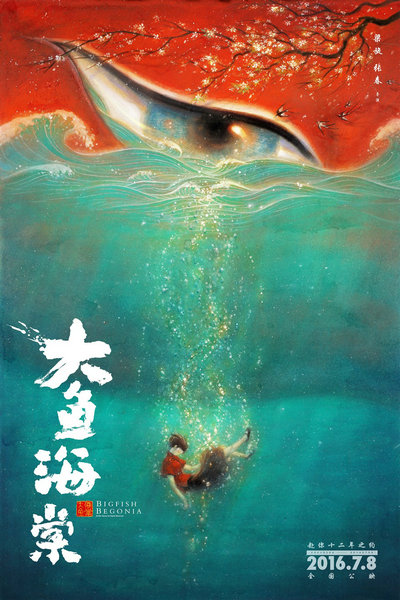 |
|
Poster of the film Big Fish & Begonia. [Photo/Mtime] |
Too many expectations, too much marketing
The idea for the film came from a 7-minute flash, of the same name, that the two directors -- Tsinghua University students at the time -- produced 12 years ago. The inspiration for that was an ancient Chinese Taoist scripture Wandering in Absolute Freedom (Xiao Yaoyou), that depicts a wild and splendid world full of imagination. The flash was an instant sensation thanks to its images and feel for Chinese culture.
The flash opens with the line: "Some fish cannot remain in captivity, because they belong to the sky" , as a way to express people's longing to be free in a romantic, fanciful way. That sentiment touched many hearts and certainly raised people's expectations for the film, where it also appears. Also the long production time and the big promotion prior to its release inflated expectation.
One promo line that appeared frequently in the media, which no doubt sent expectations soaring sky high, was "Fulfilling a 12-year promise", while another was "Chinese animation landmark", and yet another, “A new era for Chinese animated film." So, it's easy to imagine that, raised to such a psychological frenzy, any mistake, any imperfection, any failure to deliver could be an intolerable disaster. Disappointment can follow overly high expectations and though the creation itself is no doubt good, the failure to meet or manage expectations could be a reason for its downfall.
The work has many interpretations
In addressing these matters, Liang Xuan, one of the directors, explains, "The story is not about a love triangle. We left many clues lying around and some little plots in the film in the hope that the story could be interpreted in many various ways."
The directors went on to note that they would rather say the film is about "guarding the dreams in your heart" rather than some simple romantic love story and that the emotions and affections between the three protagonists (all teenagers) are as pure and innocent as could, and that’s quite different from romance.
They say that their storytelling is different from a Hollywood classic in its subtleness, which is hidden in the little detailed plots, and that it is worth a second viewing.
"My own understanding of it changed over the years of production and I see life as a cycle that never ends and everyone is a big fish. The departed will always meet again and reunite no matter what," Liang says in an interview with YiTiao, a social media platform.
So, love it or hate it, there you have it. And, with film still on the big screen, the debate rages between the two ideologically armed camps. But, let’s be fair. Big Fish & Begonia isn’t all that bad and is worth watching. Whether it’s the delicate, arty images, or the traditional Chinese culture, these are worth a visit by filmgoers. And the debate disguises or reflects another interesting fact – a growing public interest in Chinese animated works, which have been neglected for at least the last two decades.
Still, is Big Fish & Begonia, a sigh of despair or a little gasp of joy? I personally would probably go with the latter.